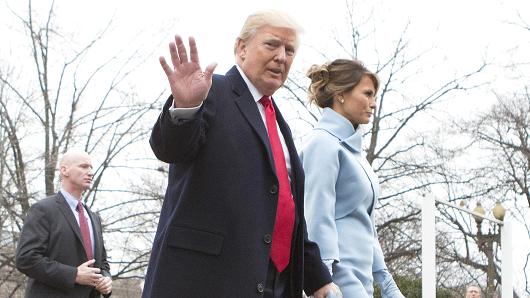History suggests the stock market will give Donald Trump a fairly warm welcome to the presidency, but it will be up to him how long the good feeling lasts.
Much is made over a president’s first 100 days in office. This is the time during which a honeymoon period with Congress and the public leads to a flurry of activity that can set the tone for what’s to come.
For Trump specifically, past trends paint a somewhat mixed picture when it comes to how Wall Street will react to what happens in Washington. The first 100 days most often have seen market gains, though the pattern has been better for Democrats than Republicans.
Since 1953, the S&P 500 has risen an average of 1.6 percent in the first 100 days of a presidency, posting gains 70 percent of the time, according to Sam Stovall, chief investment strategist at research firm CFRA. However, the index dropped an average of 0.4 percent under the five Republican presidents during the period, though it rose 60 percent of the time. Under Democrats, the market rose 80 percent of the time and posted an average gain of 3.5 percent.
Of course, each market is subject to its own dynamics, and Trump takes office at a time of cross-currents.
Economic data have been generally on the upswing save for some disappointing holiday retail numbers. Corporate America has emerged from a profits recession, with earnings reports so far suggesting a 3.2 percent increase for S&P 500 companies in the fourth quarter.
Trump also takes office amid the second-longest bull market run in history, so some kind of pause wouldn’t seem out of order. Investor sentiment is at its lowest point since the election, with just 37 percent of respondents to the latest American Association of Individual Investors survey in the bullish camp.
“Our models do continue to show that weakness may be approaching in the short term, but stay flexible, because it seems ‘the inauguration will be a top’ theory has picked up steam across the investment landscape, and it would be SO like Mr. Market to surprise everyone by rising once again over the next few days,” Jeffrey Saut, chief market strategist at Raymond James, wrote in an Inauguration Day note to clients.
“Dow 20,000 and the recent highs in the S&P 500 are just sitting there looking attractive, so this could very well be a case where the market rallies briefly, hits those targets, and then falls. So stay alert, because volatility may be about to welcome Donald Trump to the highest office in the land,” Saut added.
The market greeted Trump’s November election with enthusiasm. Dow industrials quickly surged as much as 7.5 percent before cooling off over the past month or so. Since Election Day, exchange-traded fund investors have poured nearly $14 billion into the SPDR S&P 500 Trust that tracks the index, and another $6.5 billion into the Financial Select Sector SPDR in a bet on banks, according to FactSet.
Stocks rose more in advance of Trump’s first day, with the Dow gaining 100 points at the start Friday. That stood in stark contrast to Barack Obama’s swearing-in back in 2009 when the market, stricken by the lingering financial crisis, tanked about 5.3 percent. First days in office are rarely kind to presidents, with only two — Dwight D. Eisenhower and John F. Kennedy — seeing gains, according to Bespoke Investment Group.
“If the DJIA is going to get to 20K before the end of the week, bulls are going to have to make Inauguration Days great again,” Bespoke said in a note, playing on Trump’s campaign slogan to “Make America Great Again.”
Beyond that and into the first 100 days, the direction of the market likely will depend on how strong the economic data remain and how much visibility investors get on the new administration’s direction.
Trump brings with him promises to reverse much of Obama’s actions, though the extent to which that happens remains to be seen.
“The market can (go higher), but that’s based less on Trump coming in and more on the fact that fundamentals have gotten better,” said Art Hogan, chief market strategist at Wunderlich Securities. “All sorts of things that could provide stimulus to an economy that’s already improving can be brought forward, but none of it is going to happen in the first 100 days.”




